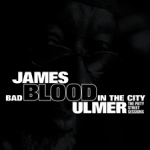Home » Jazz Articles » Album Review » James Blood Ulmer: Bad Blood in the City: The Piety Stre...
James Blood Ulmer: Bad Blood in the City: The Piety Street Sessions
In New Orleans, two years after Hurricane Katrina, the music and the spirit lives on, but it wouldn't be Ulmer without the angst and the examination of the soul of America which has marked so much of his work over the years. The five Ulmer originals and six songs by classic blues figures re-examine themes such as race, poverty, loss, survival, faith, and government negligence in the aftermath of the devastating hurricane.
"Lord there's a thousand people, they don't have no place to go conjures up images of the ninth ward in 2005, but the lyrics are from Bessie Smith's "Backwater Blues," dating from 1927. The Mississippi River, it seems, has always been a cruel mistress. On this slow-burning classic, Ulmer gives a fine vocal performance, and Charlie Burnham's fiddle cries sympathetically. Throughout the album, the fiddle, mandolin and flute provide lovely contrast to the gruff beauty of Ulmer's voice.
Ulmer's singing, that gravelly growl, has always been as distinctive and defining as the sound of his guitar. Nobody sounds like Ulmer. Odd then, that he should sound uncannily like John Lee Hooker on the master's "This Land is No One's Land." Strange that he seemingly imitates Howlin' Wolf on "Commit a Crime." On Junior Kimbrough's "Sad Days, Lonely Nights," Ulmer's voice is so hoarse as to age him ten years. There is however, a real energy to the music.
Those still not entirely used to the reincarnation of James Blood Ulmer as a blues man, despite the Down Beat awards and a Grammy nomination, will find the Ulmer of old, the prince of Black Rock, on his self-penned "Survivors of the Hurricane." This is the strongest song on the album—Vernon Reid lets fly on guitar and Ulmer delivers a caustic attack on the government ("Here comes Johnny-come-lately") for its late appearance after Katrina struck.
"Katrina" proves that Ulmer can write a blues tune of real quality; so why so many covers? A few more Ulmer originals of the caliber of "Survivors of the Hurricane" and "Katrina" would have gone a long way to making this an album to rank alongside America, Do you Remember the Love? (Bluenote,1987).
Track Listing
Survivors of the Hurricane; Sad Days, Lonely Nights; Katrina; Let's Talk about Jesus; This Land is No One's Land; Dead Presidents; Commit a Crime; Grinnin' in your Face; There is power in the Blues; Backwater Blues; Old Slave Master.
Personnel
James Blood Ulmer
guitarJames Blood Ulmer: guitar, vocals; Vernon Reid: electric and acoustic guitar; Charlie Burnham: electric fiddle and mandolin; David Barnes: harmonica; Leon Gruenbaum: Fender Rhodes, piano, Hammond B-3 organ, samchillian, mellotron, clarinet; Mark Peterson: electric and upright bass; Aubrey Dayle: drums, percussion; Irene Datcher: background vocals.
Album information
Title: Bad Blood In The City: The Piety Street Sessions | Year Released: 2007 | Record Label: Hyena Records
< Previous
Mercy!
Next >
Keiko Matsui: Heart & Soul
Comments
About James Blood Ulmer
Instrument: Guitar
Related Articles | Concerts | Albums | Photos | Similar ToTags
For the Love of Jazz
 All About Jazz has been a pillar of jazz since 1995, championing it as an art form and, more importantly, supporting the musicians who create it. Our enduring commitment has made "AAJ" one of the most culturally important websites of its kind, read by hundreds of thousands of fans, musicians and industry figures every month.
All About Jazz has been a pillar of jazz since 1995, championing it as an art form and, more importantly, supporting the musicians who create it. Our enduring commitment has made "AAJ" one of the most culturally important websites of its kind, read by hundreds of thousands of fans, musicians and industry figures every month.




















